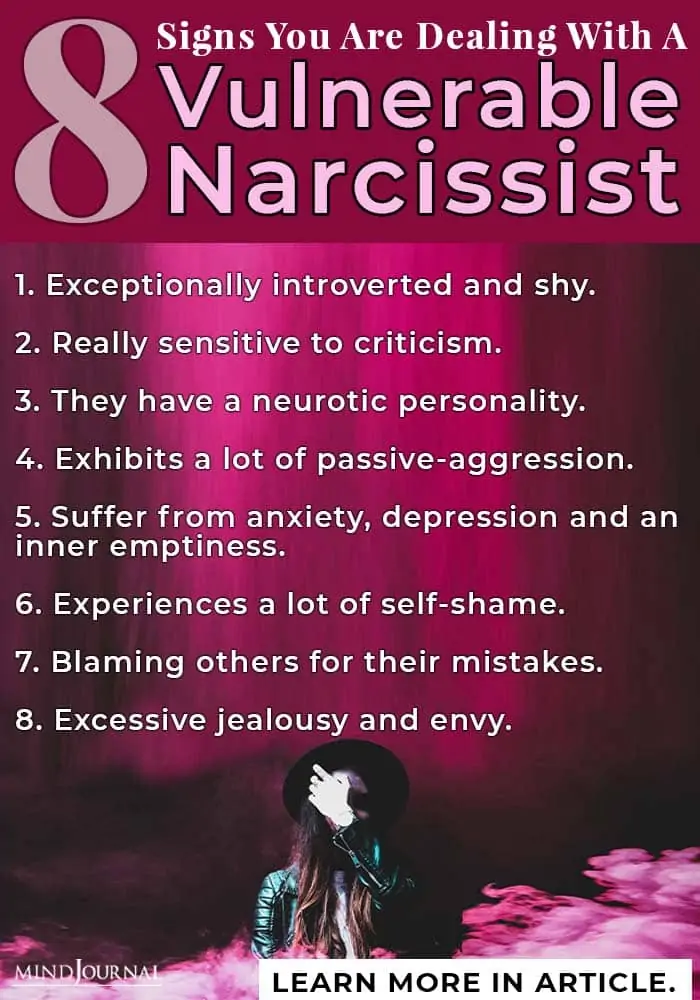The word ‘narcissist’ has become very common now, with many people just casually throwing it around whenever they want to describe anyone who might not be a good person. The interesting thing about narcissism is that there’s not just one narcissist, there are many kinds of narcissists. One of these narcissists is the vulnerable narcissist.
A vulnerable narcissist is different in the sense that their narcissism symptoms aren’t always that prominent, and they don’t exhibit the ‘classic’ and ‘conventional’ signs of narcissism like maybe the others do. This means, they are still narcissists, but their behavioral traits don’t always seem narcissistic, such as:
- Being shy and reserved.
- Feeling sensitive about what others think about them.
- Modesty.
These are just a few signs that point to the fact that someone might a vulnerable narcissist; there are many other traits that will help you understand whether or not you are dealing with a vulnerable narcissist.
Here Are 8 Signs You Are Dealing With A Vulnerable Narcissist

1. Exceptionally introverted and shy.
Vulnerable narcissists tend to be more on the introverted and shy side. Most of the time introverts are seen as unfriendly, unapproachable, negative, too quiet, and someone who needs a lot of solitude to function. All this tends to be seen as red flags sometimes. Narcissistic people are petrified of others seeing their weak points, especially their shortcomings and failures.
The moment their innermost and private feelings are exposed, they lose the superiority complex they constantly bask in. This is why vulnerable narcissists tend to mostly avoid social events unless they have a strong ulterior motive and a personal agenda. Their narcissism also makes them very distrustful of others, and their intentions.
Read: This Inkblot Test Will Determine If You Are A Narcissist, Psychopath, Both Or Neither: QUIZ
2. Really sensitive to criticism.
Narcissism means a low, even damaged self-esteem and self-worth, and a lot of insecurity. This shows up as massive sensitivity to any sort of criticism, no matter how constructive it might be. Even though sensitivity to criticism is nothing new when it comes to narcissism, it seems to be an even bigger issue when vulnerable narcissists are concerned.
They just cannot take criticism of any kind, even if it’s for their own good. Most of the time, they will use sarcasm, cutting remarks, and horrible retorts to pretend that this does not affect them, but the truth is, it affects them deeply. They feel attacked, insulted, humiliated, and mortified on the inside. In their heads, they are absolutely perfect and criticism directly injures the glamorized view they have of themselves.
3. They have a neurotic personality.
Having a neurotic personality is crucial when it comes to being a vulnerable narcissist. Having a neurotic personality means having the following traits:
- Vulnerability.
- Antagonism.
- Depressed demeanor.
- Excessive self-gratification.
- Self-consciousness.
- Constant feelings of panic and anxiety.
When you are a narcissist, and you are high on self-centeredness, self-obsession, and neuroticism, you will naturally dwell a lot about your social status, physical appearance, personal relationships, and its status, career, and money. In other words, you will constantly obsess about all those things that will help you maintain a façade of superior social status.
Related: The Ninja Narcissist: 7 Secret Signs Of A Covert Introvert Narcissist
4. Exhibits a lot of passive-aggression.
Vulnerable narcissists are pros when it comes to being passive-aggressive. Passive aggression is mostly their choice of weapon when they want to manipulate someone to get something done. Internally, they feel that they are ‘special’ which is why they should always get what they expect from others. They also have a deep-seated desire to be revengeful with people who have hurt or wronged them in any way.
When they are being passive-aggressive, they might exhibit the following behaviors:
- Silent treatment.
- Trying to sabotage someone professionally or personally.
- Subtly playing the blame game, and even shifting blame onto others.
- Insulting someone in the name of humor.
- Delaying tasks that they feel are not of their standards.
5. Suffer from anxiety, depression and an inner emptiness.
Vulnerable narcissists tend to suffer from depression and anxiety more than people who are not vulnerable narcissists. This is because they have an inherent fear of failure that they are not good enough to be successful, which further fuels their anxiety and feelings of low self-esteem. Most of the time, they feel an inner emptiness that drives them to sabotage their personal relationships too.
Depressive and suicidal thoughts are a constant fixture in their lives, and when you add a lack of appreciation and acknowledgment to that, it leads to more bitterness, resentment, and feelings of sadness.
6. Experiences a lot of self-shame.
When it comes to vulnerable narcissism, their self-image is broken into two parts – their positive self-image centers around extravagant pride, and their negative self-image is full of shame. This split is one of the biggest reasons why they are so sensitive to criticism; it simply forces them to confront their drawbacks, which leads to deep feelings of shame.
When they have positive comments coming their way, they are able to hide their self-shame behind that. But when it comes to absorbing criticism and trying to understand their flaws, their negative self-image forces their pride out of the way, and this leads to excessive feelings of self-disgust, embarrassment, and finally shame.
Want to know more about a vulnerable narcissist? Check this video out below!
7. Blaming others for their mistakes.
Another prominent facet of vulnerable narcissism is playing the blame game. Whenever they are in hot water, they never hesitate to shift the blame on someone else, as long as they are getting to save themselves. Even if they are the mastermind of it all, somehow it will be someone else’s fault; maybe they were ‘manipulated’ or ‘coerced’ into doing it.
If they are consistently late for work, it’s because their spouse took too long in the washroom. If they forgot their daughter’s birthday, it’s because their boss gave them too much work. Broke a friend’s promise and trust? Well, they were ‘manipulated’ into doing that! On the rare occasions when they do accept their mistakes, they do so because they are either caught red-handed or are cornered.
Even if they do admit their guilt, don’t expect to see any genuine remorse, sadness or regret in them. They are doing so only because their bluff has been called.
Related: Ninja Narcissists: How They Torment You With Their Sneak Attacks
8. Excessive jealousy and envy.
Narcissistic people are always envious of others and their lives; no matter how good they might have it, they are never happy, and nothing is ever enough for them. They are especially jealous of people who are rich, powerful, and good-looking because they covet these things more than anything else. Additionally, they also feel that others are envious of them because of how ‘superior’ they are.
Vulnerable narcissists never show these negative feelings openly, rather they would be bitter and resentful towards people who they feel are responsible for them feeling like this. Moreover, they also feel resentful when they don’t get what they feel they are entitled to and deserve.
It can be hard and very challenging to interact with a vulnerable narcissist, due to them being withdrawn, shy, and reserved. But when things get too much, and their narcissism doesn’t seem to improve, then maybe, you need to cut off all ties and move on with your life. The more you let a narcissist draw you in, the tougher it will be for you to protect your mental health and peace of mind.
Frequently Asked Questions
How to manipulate a narcissist to talk to you?
Some of the best ways to manipulate a narcissist to talk to you are by educating yourself about their personality, being clear about your boundaries, and always speaking up for yourself.
How to manipulate a vulnerable narcissist?
Manipulating and handling a vulnerable narcissist is easy once you grasp what makes them tick. Standing your ground, not letting them get to you, and calling them out on their problematic behavior are some of the best ways to handle vulnerable narcissists.









